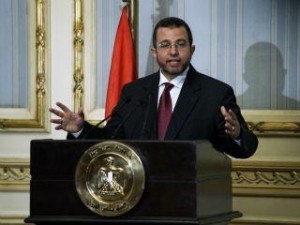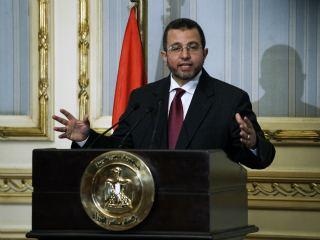
(AFP PHOTO)
Prime Minister Hesham Qandil held a ministerial meeting on Sunday to discuss a new draft law for Non Governmental Organisations (NGOs), which aims to avoid the drawbacks of the current law, reported MENA.
The ministers of justice, interior, finance, legal affairs and social affairs, along with several experts, attended the meeting to discuss a draft that has endured five months of “social dialogue.”
The draft law focuses on the registration of NGOs, the status of foreign organisations, NGO funding, NGO federations, and the mechanisms for dissolution of the organisation in the event of wrongdoing.
The State council Vice President Mohamed El-Demerdash held a press conference after the meeting and announced that the registration of local NGOs would be through notification if it includes at least 10 people, while foreign organisations would require a license.
El-Demerdash added that the draft law aims to expand the civil role of NGOs and remove the restrictions that existed under the former regime.
However, Gamal Eid, a human rights lawyer and executive director of the Arabic Network of Human Rights Information, disagreed saying the draft will law will lead to more police power over NGOs, and restricts the role of the civil society.
“The old regime used to let NGOs work for a few years without a license then they would dissolve it. The whole process was totally dominated by state security” Eid said.
The meeting discussed the licensing process and its relation to state sovereignty, El-Demerdash said that the rejection or approval of NGOs should be explained clearly to avoid any legal problems.
He added that transparency is essential when it comes to the nature of NGOs and the sources of their funding.
An agreement was reached regarding the procedures of dissolving an NGO; such action would be the jurisdiction of administrative judiciary through a court verdict rather than an administrative decision.
Eid explained that there were three proposed draft laws for NGOs, one prepared by the civil society, another by the Freedom and Justice Party and the third being discussed at the meeting, prepared by the government.
“They are discussing the worst one, although they promised to look into the other two proposals, this draft law will bring back state control over NGOs” Eid said.
El-Demerdash announced that three sessions of social dialogue regarding the draft law will be held in the Social Contract centre of the Cabinet for those interested in sharing their opinions and concerns. He added that the final draft will be ready within two months to be approved by the new parliament.
He stated that there are more than 40,000 NGOs in Egypt and 79 foreign organizations.
Negad El-Boraei, a human rights lawyer, accused the government of “working in the shadows,” saying that the situation of the draft law doesn’t look promising.
The meeting was expected to discuss the legal situation of the Muslim Brotherhood and whether it should be considered by law as an NGO or an association or other legal structure, but El-Demerdash said they didn’t tackle that issue.

